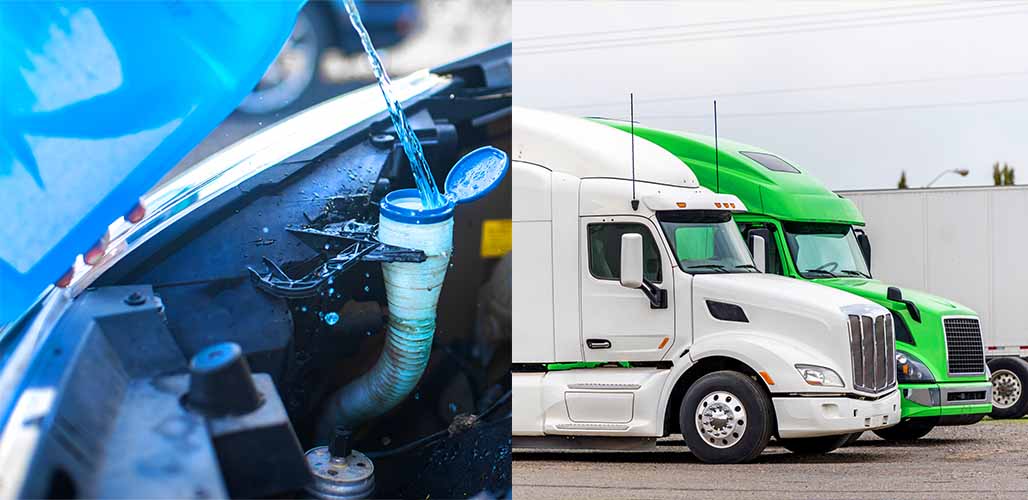Why Does My Truck Smell Like Antifreeze?
Sadly, if you can smell antifreeze from inside your truck’s cab or near the engine, it’s not a good sign. The most common reason why trucks smell of antifreeze, provided you haven’t just topped it up, is because there is a fault somewhere that has caused a leak. The radiator, gaskets, hoses or heater are the most likely culprits. Today I’ll give you a quick rundown of what might be going on.
Contents
- What does antifreeze smell like?
- Is smelling antifreeze a problem?
- Why does my truck smell like antifreeze?
- Do blown gaskets cause an antifreeze smell?
- Is my truck leaking antifreeze?
The sweet smell of antifreeze is surprisingly popular with some people, but it’s not an aroma you want to discover in your truck. While there are a variety of scents that are perfectly normal for your vehicle, there are some that could signal a problem. One such problematic smell is antifreeze.
What Does Antifreeze Smell Like?
Coolant and antifreeze have a sweet smell that some people liken to maple syrup. This is because they are an extremely toxic liquid called ethylene glycol. This organic compound has no color or odor in its pure state. It is a viscous liquid that is flammable. If you were to drink it, the taste would be very sweet. However, it is toxic, and people should never drink antifreeze.
Is Smelling Antifreeze a Problem?
You won’t smell antifreeze with a properly functioning vehicle. If you smell antifreeze, it is a sign of a problem. Catch the smell early on, and you can potentially prevent major issues with your vehicle running. Ignore that smell, and you could have some expensive repair bills on your hands.
A good check is to look at the engine temperature gauge on the gauge cluster in the dashboard. If the engine isn’t overheating, then you probably caught the problem early. This can help you prevent damage by acting quickly to avoid further antifreeze leakage.
Why Does My Truck Smell Like Antifreeze?
The short answer to why you smell antifreeze is that there is likely a leak somewhere. However, how and when you smell the antifreeze can help you narrow down where the problem might be.
- Radiator
- Heater core
- Gaskets and cylinders
- Pipes and hoses
The Radiator
If you smell antifreeze when you stand outside of the vehicle, then a good place to start looking is around the radiator. Typically, the radiator is located in the engine bay at the front. The antifreeze cycles through the radiator and then back through the engine components. While circulating through the radiator, it lets off the heat and reduces temperature. Then the cooled antifreeze helps to keep the hot engine cool when cycling back through.
Because it’s at the front of the engine bay, it is right by the grille, so the leak is easy to smell when outside the vehicle. The leak could be from the actual radiator or the cap. The coolant system is under high pressure that gets held in place by the cap. If the cap isn’t tightly secured, it can leak out. You may see steam or liquid bubbling out of the cap. You may also see antifreeze leak onto the ground when you park the car.
To repair a radiator leak, you may be able to patch it. However, this isn’t a long-term solution. The patch is a weak point in the radiator and will eventually be an issue again, especially if the leak is a large hole. A more expensive but permanent fix is to replace the radiator. If the leak is from the cap, the repair could be as simple as tightening the cap.
Heater Core
Instead of smelling the antifreeze outside the vehicle, you may smell it when you sit in it. If this is the case, the first logical place to look is with the heater core. With this type of leak, you won’t see any puddles on the ground. You smell the antifreeze in the passenger compartment because the heater core transfers the warm air to the cabin. If there is a hole in the core, then the antifreeze leaks in and mixes with the air. You then smell that air when sitting in the car. When you smell antifreeze, but there is no visible leak anywhere, this is most commonly the problem.
Similar to the vehicle’s radiator, you can repair a leaking heater core. There are pour-in formulas that automatically seal up any leaks. If the damage is too large for this, the next option is to replace the heater core. However, this solution can be expensive because of the difficult location of the heater core.
Intake Manifold Gasket, or Cylinder Head
The most common location for an antifreeze leak is with the head gasket. Unfortunately, you will not see an antifreeze puddle on the ground with this type of leak. The antifreeze leaks into the combustion chamber. You would smell the leak because the antifreeze is getting burned in the combustion chamber.
If you suspect this type of leak, take a walk to the back of your car. There will be a lot of white smoke. This is because you have an extra element getting burned. A properly running vehicle has transparent smoke, so you do not see anything from the exhaust. The white smoke lets you know that something else is getting burned, which signals that something is wrong with your vehicle.
Pipe or Hose
This is not a common source of the antifreeze leak problem, but it can happen. Follow the engine cooling system and check the pipes and hoses. If you see any with what looks like liquid on them, it could be the source of the leak. Depending on the size of the leak, you may not get a strong smell or any at all.
The antifreeze isn’t near the exterior of the vehicle, and it isn’t getting burned. You may see drops underneath the vehicle if the leak is large enough or if the vehicle sits for long enough. Wait until the vehicle is cool to touch the liquid. It has a watery consistency but feels oily to the touch. It will also either have an orange or green color.

Why Does My Truck Smell Like Antifreeze?
If you see drops or puddles on the ground under your parked car or smell antifreeze, do not wait to investigate the issue. When left ignored, the antifreeze will continue to leak. This means the amount of antifreeze in your system continues to reduce.
Eventually, there isn’t enough antifreeze in the cooling system to effectively cool the engine. The engine will overheat, and now you have a big problem on your hands.






